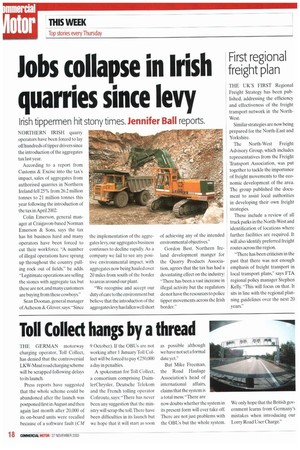Jobs collapse in Irish quarries since le
Page 18

If you've noticed an error in this article please click here to report it so we can fix it.
Irish tippermen hit stony times. Jennifer Ball reports.
NORTHERN IRISH quarry operators have been forced to lay off hundreds of tipper drivers since the introduction of the aggregates tax last year.
According to a report from Customs & Excise into the tax's impact, sales of aggregates from authorised quarries in Northern Ireland fell 25% from 26.2 million tonnes to 21 million tonnes this year following the introduction of the tax in April 2002.
Colin Emerson, general manager at Craigavon-based Norman Emerson & Sons, says the tax has hit business hard and many operators have been forced to cut their workforce. "A number of illegal operations have sprung up throughout the country pulling rock out of fields,he adds. "Legitimate operations are selling the stones with aggregate tax but these are not, and many customers are buying from these cowboys.
Sean Doonan. general manager of Acheson & Glover. says: "Since the implementation of the aggregates levy, our aggregates business continues to decline rapidly. As a company we fail to see any positive environmental impact, with aggregates now being hauled over 20 miles from south of the border to areas around our plant.
"We recognise and accept our duty of care to the environment but believe that the introduction of the aggregates levy has fallen well short of achieving any of the intended environmental objectives."
Gordon Best. Northern Ireland development manger for the Quarry Products Association, agrees that the tax has had a devastating effect on the industry: "There has been a vast increase in illegal activity but the regulators do not have the resources to police tipper movements across the Irish border."


























































































































































































